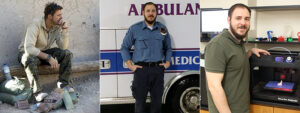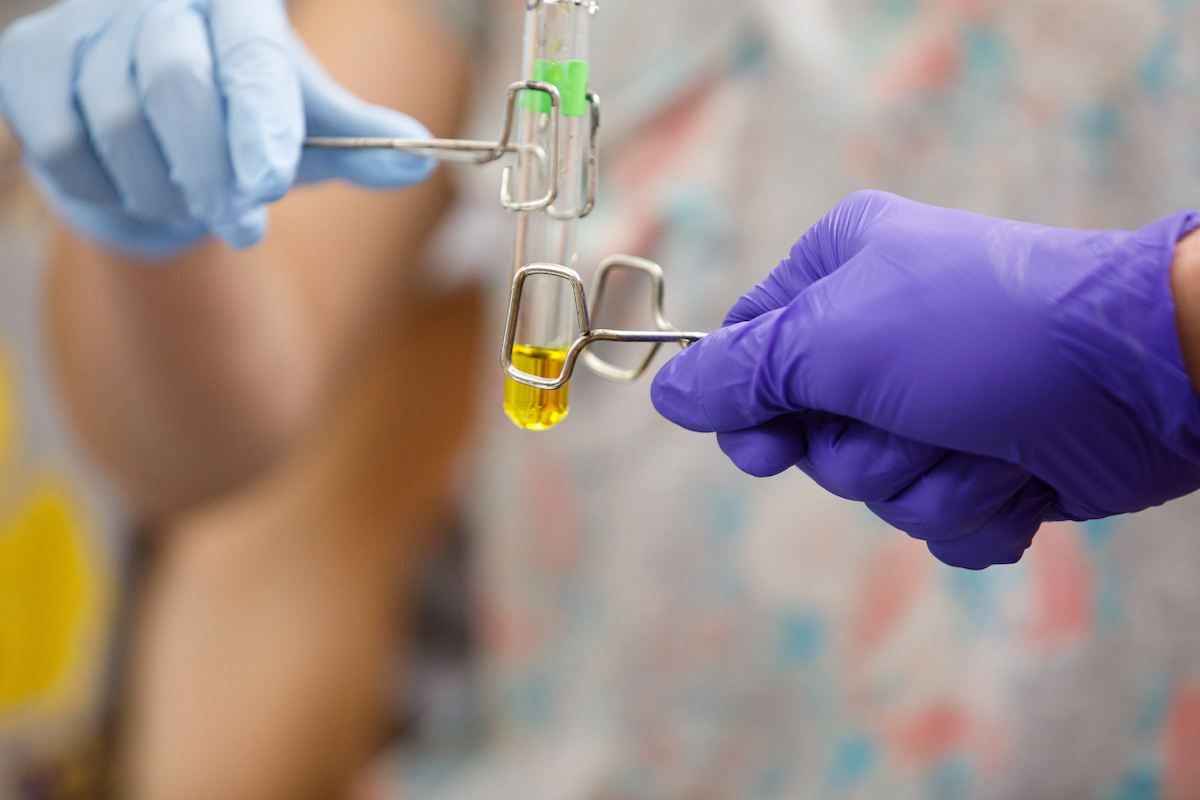Bram Siemers, ’19, Uses Military Experience to Carve Out New Direction
Related Programs
Related Posts
Connect With Us
December 19, 2017

Bram Siemers, ’19, enrolled at Albion College as a biochemistry major last January after transferring from Jackson College. He is drawing from his experience gained after four years in the Marines that included deployments in Iraq and Afghanistan. From left: Siemers in 2010 during his seven-month stint in Helmand Province, Afghanistan, where he was a Reconnaissance Team Leader and rose to the rank of sergeant; when not in class, Siemers works as a paramedic for Jackson Community Ambulance; on campus, Siemers is working extensively with 3D printing in hopes of eventually working in the bioengineering field.
Bram Siemers sometimes listens to the problems voiced by his fellow students, some of whom are a decade younger than he is. And he smiles.
They can range from bad dining hall menus to tough courses to relationship issues to lack of sleep to that balky laptop.
He’s sympathetic and understanding and realizes time and circumstances can make situations seem worse than they really are. After all, you learn a lot about what people can endure when you’ve been around the block the way he has.
He judges no one but still smiles.
Problems? How about surviving an ambush near an Afghanistan canal when the Taliban is firing on you and your company of Marines from three sides?
How about seeing injuries caused by the most complex weapons ever designed?
Or perhaps returning to the United States after four years of service and not knowing what you wanted to do, where you wanted to do it or how you were going to get there?
But Siemers, a 29-year-old Jackson native, hopes to graduate from Albion College with a degree in biochemistry in 2019 and use the kind of experience most college students can only imagine to create a high-tech career.
Looking for a new direction
He also knows this: He has taken his graphic and unforgettable experiences as a Marine, which included a comparatively routine deployment in Iraq and a hell-on-earth deployment in Afghanistan where he saw combat nearly every day, to help carve out his future. And he sees Albion as the way to help him get there.
“I was having trouble transitioning as a veteran,” says Siemers, the fifth member of his family to join the Marines.
But after earning his associate’s degree in emergency medicine at Jackson College, he was ready for more and started at Albion last January.
He knows he is removed in more ways than one from most of the students who attend Albion. But he’s fine with that.
“Sometimes they call me ‘grandpa’ or the ‘old guy,’” he says. “But that’s swell. Some of these kids here are so smart and I feel so stupid around them. It’s harder being older and going back to school. It’s just life stuff and balancing life and school. But when some of them talk about their problems, I just tell them, ‘Dude, go out and relax.’”
Siemers never really had that luxury. He joined the Marines out of high school and, after one seven-month deployment in Iraq, was sent to Afghanistan. While there, he became a Reconnaissance Team Leader and rose to the rank of sergeant. Upon his return, he soon decided to leave the military but not long after found himself back in the region as a private military contractor in Iraq.
When that position was eliminated he came back to Michigan, eventually enrolling at Jackson while still searching for the next stage in his career. He then transferred to Albion.
The experience in the Marines has shaped him in ways he never imagined, but he’s using what he learned to forge that new career.
He is intrigued with the study of regenerative medicine, especially using 3D and 4D technology to re-create organs on the body.
He’s learning the basics at Albion and then hopes to go to graduate school and get into the field of biomedical technology.
“I like health care,” he says. “It’s interesting. My fighting impulses are still there but it’s just a different type of fight.”
Wave of the future
Siemers admits he gets bored quickly and began reading about 3D technology last year. When he enrolled at Albion, he sought out several professors for their input.
“He was interested in bioengineering, but as we talked more he had more interest in the bio than in the engineering,” says one of his mentors, biochemistry professor Craig Streu, ‘04. “We talked about artificial limbs, robotic devices that help people walk. There are scientists in labs growing new ears or kidneys and he said, ‘Tell me more about that.’ These discussions help clarify what excites a student and how that translates into a career. I told him there are lots of ways to do what he wanted, and what seemed to capture his imagination was tissue regrowth. That’s stem-cell biology, and we’ve been talking about ways to help him achieve those career goals.”
Siemers, who also works as a paramedic for Jackson Community Ambulance, plans to continue his study this spring and summer, and develop a Foundation for Undergraduate Research, Scholarship and Creative Activity project to present at the Elkin R. Isaac Student Research Symposium in 2019.
Siemers, who has also been working with physics professor Charles Moreau, believes he’s in the ideal place to further his interests.
“Everybody is open to an idea and making it work,” Siemers says. “I enjoy that the classes I take can apply to my studies with the 3D bio-printer project, and they also help with treating patients while on the ambulance.”
Streu says Siemers’ background in the military has helped him move forward.
“Veterans certainly know what they want,” Streu says. “They’re focused and goal-oriented. By sitting down and talking to him we found out what excited him. I mean, just listen to him.”
Siemers knows he has a long way to go in a field he sees as the wave of the future.
A member of the campus engineering club who is hoping to gain an internship in the spring, Siemers has his own 3D printer, makes use of the 3D printers on campus and hopes to build his own bio printer. He also hopes to do some tissue-engineering research with biology professor Ken Saville next semester if an internship opportunity doesn’t come through.
Siemers’ interest lies in creating 3D images out of jell and protein enzymes, as opposed to the traditional plastics that 3D printers use, which can one day be implanted in the human body. The technology will, in time, create all sorts of organs.
But he is restless and anxious to move on, to see what is next in a life that has already been challenging, exciting and dangerous.
“I’m trying to stay busy,” he says. “I want to get in there and start doing it.”
